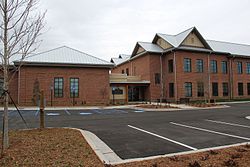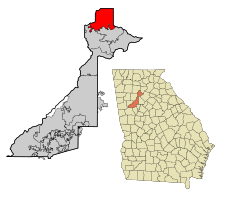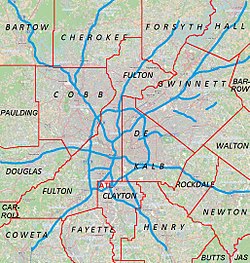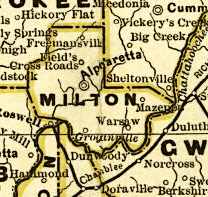Milton, Georgia
Milton, Georgia | |
|---|---|
 Milton City Hall | |
| Motto(s): "Named best quality of life in Georgia" | |
 Location in Fulton County and the state of Georgia | |
 Milton Location of Milton in Metro Atlanta | |
| Coordinates: 34°07′56″N 84°18′02″W / 34.1321631°N 84.3006660°WCoordinates: 34°07′56″N 84°18′02″W / 34.1321631°N 84.3006660°W | |
| Country | United States |
| State | Georgia |
| County | Fulton |
| Incorporated | December 1, 2006 |
| Government | |
| • Mayor | |
| Area | |
| • Total | 39.11 sq mi (101.29 km2) |
| • Land | 38.49 sq mi (99.69 km2) |
| • Water | 0.61 sq mi (1.59 km2) 1.6% |
| Elevation | 978 ft (298 m) |
| Population (2010) | |
| • Total | 32,661 |
| • Estimate (2019)[2] | 39,587 |
| • Density | 1,028.45/sq mi (397.08/km2) |
| Time zone | UTC-5 (EST) |
| • Summer (DST) | UTC-4 (EDT) |
| ZIP codes | 30004, 30009 |
| Area code(s) | 770, 678 |
| FIPS code | 13-51670 |
| Website | www |
Milton is a city in Fulton County, Georgia, United States. Located about 30 miles due north of Atlanta, Milton is known for its rural and equestrian heritage, evolving downtown and high quality of life[citation needed]. The City was incorporated on December 1, 2006, out of the unincorporated northernmost part of northern Fulton County. As of the 2010 census, Milton's population was 32,661,[3] with an estimated population of 39,587 in 2019.[4]
Milton is named in honor of the former Milton County, which was named after Revolutionary War hero John Milton.[5] The portion of north Fulton County generally north of the Chattahoochee River comprises most of the territory of the former Milton County.
History[]
Incorporation[]
A citizens' committee was formed in 2005 to help determine the viability of incorporating unincorporated northern Fulton County. After debate, the Georgia State House and Senate approved a bill creating the city of Milton on March 9, 2006. On March 28, Governor Sonny Perdue signed the bill into law. In July 2006, voters approved a ballot referendum on July 18 by more than 86%. On August 4, 2006, Governor Perdue appointed a five-person commission to serve as the interim government of Milton (composed of Ron Wallace, Brandon Beach, Gregory Mishkin, Dan Phalan and Cecil Pruitt [6]) . Milton adopted the existing county ordinances on December 1, 2006.
Geography[]
Milton occupies the northern tip of Fulton County -- bounded on the south by the cities of Roswell and Alpharetta, on the east by Forsyth County and Alpharetta, and on the north and west by Cherokee County. The City's latest Comprehensive Plan[7] divides Milton into eight "character areas" that each have, to some degree, their own unique attributes; they are Arnold Mill, Bethany, Birmingham, Central Milton, Crabapple, Deerfield, Milton Lakes and Sweetapple.
The two major north-south roads that run through Milton are State Route 9 (in the city's southeast) and State Route 372 (more central), which is also known as Birmingham Highway. State Route 140 (Arnold Mill Road) is on the southwest part of Milton.
According to the U.S. Census Bureau, the city of Milton has a total area of 39.2 square miles (101.4 km2), of which 38.5 square miles (99.8 km2) is land and 0.62 square miles (1.6 km2), or 1.59%, is water.[8] The elevation ranges from 950 to 1,280 feet (290 to 390 m) above sea level.
As of April 2007, the US Postal Service recognizes Milton as a valid alias for ZIP code 30004, which is served from the Alpharetta post office.
Transportation[]
Major highways[]
 State Route 9
State Route 9 State Route 140
State Route 140 State Route 400
State Route 400 State Route 372
State Route 372
Pedestrians and cycling[]
- Big Creek Greenway (Proposed)[9]
Demographics[]
| Historical population | |||
|---|---|---|---|
| Census | Pop. | %± | |
| 2010 | 32,661 | — | |
| 2019 (est.) | 39,587 | [2] | 21.2% |
| U.S. Decennial Census[10] | |||

According to the U.S. Census Bureau (and its 2019 American Community Survey), the population of Milton[11] is 39,587. The city is 73.2% white, 12.9% Asian (8.3% Indian, 2.3% Chinese, 0.3% Filipino, 0.2% Japanese, 1.2% Korean, 0.1% Vietnamese, 0.5% other Asian), 11.3% black or African American, and 5.9% Hispanic or Latino of any race (2.4% Mexican, 1.4% Puerto Rican, 0.5% Cuban, 1.5% "Other Hispanic or Latino"), and 0.1% Native American.[3] Some 28.5% of Milton's population is under 18 years old, while 8.3% is age 65 and over.
Milton is one of the wealthiest cities in the state of Georgia[12] with a median household income of $128,559.[13] Between 2015-2019, 76.4% of people (or an immediate family member) in Milton owned their home; the median value of such housing units was $541,000. Approximately 3.5% of the population lives below the poverty line. The vast majority of Milton is part of the ZIP code 30004, which has an average household income of $99,412.[14]
In terms of education, 96.4% of those age 25 and above are (at least) high school graduates while 70.9% have a bachelor's degree or higher.[13] Some 68.8% of those age 16 and over have jobs, with the mean commuting time for work being 29.5 minutes.
Government[]
Officials[]
- Mayor: Joe Lockwood
- District 1/Post 1: Peyton Jamison (Mayor Pro Tem)
- District 1/Post 2: Carol Cookerly
- District 2/Post 1: Laura Bentley
- District 2/Post 2: Paul Moore
- District 3/Post 1: Joe Longoria
- District 3/Post 2: Rick Mohrig
Council history[]
| District | 2007 | 2008 | 2009 | 2010 | 2011 | 2012 |
|---|---|---|---|---|---|---|
| First | Karen Thurman | |||||
| Second | Julie Zahner Bailey | Matt Kunz | ||||
| Third | Bill Lusk | |||||
| Fourth | Neal O'Brien | Burt Hewitt | ||||
| Fifth | Tina D'Aversa | Joe Longoria | ||||
| Sixth | Rick Mohrig | Alan Tart | Lance Large | |||
Education[]
The city is served by Fulton County Schools[15]
Elementary schools (grades K-5):[16]
- Birmingham Falls Elementary School in Milton
- Cogburn Woods Elementary School in Milton
- Crabapple Crossing Elementary School in Milton
- Summit Hill Elementary School in Milton
Middle schools (grades 6-8):[17]
- Hopewell Middle School in Milton
- Northwestern Middle School in Milton
High schools (grades 9-12):[18]
- Milton High School in Milton
- Cambridge High School in Milton
Private schools:
- Mill Springs Academy
- King's Ridge Christian School
- St. Francis Schools (K-12)
References[]
- ^ "2019 U.S. Gazetteer Files". United States Census Bureau. Retrieved July 9, 2020.
- ^ Jump up to: a b "Population and Housing Unit Estimates". United States Census Bureau. May 24, 2020. Retrieved May 27, 2020.
- ^ Jump up to: a b Bureau, U.S. Census. "American FactFinder - Results". factfinder2.census.gov. Retrieved 2017-08-27.[dead link]
- ^ "Population and Housing Unit Estimates". Retrieved May 21, 2020.
- ^ "About Milton | City of Milton, GA". www.cityofmiltonga.us. Retrieved 2017-08-27.
- ^ "Georgia Governor Sonny Perdue - Governor Perdue Announces Johns Creek and Milton Appointments". sonnyperdue.georgia.gov. Retrieved 21 March 2018.
- ^ "The City of Milton Comprehensive Plan Update 2016".
- ^ "Geographic Identifiers: 2010 Census Summary File 1 (G001), Milton city, Georgia". American FactFinder. U.S. Census Bureau. Archived from the original on February 13, 2020. Retrieved April 29, 2016.
- ^ "Big Creek Greenway Connection Concept Study - City of Milton, GA". www.cityofmiltonga.us.
- ^ "Census of Population and Housing". Census.gov. Retrieved June 4, 2015.
- ^ "Explore Census Data". data.census.gov. Retrieved 2021-06-07.
- ^ "Ranking: N. Fulton city is the richest in Georgia". ajc. Retrieved 2018-11-28.
- ^ Jump up to: a b "U.S. Census Bureau QuickFacts: Milton city, Georgia". www.census.gov. Retrieved 2021-06-07.
- ^ "Communities in Zip Code 30004". www.househunt.com. Retrieved 2017-08-27.
- ^ "About Fulton." Fulton County School System. Accessed April 17, 2010.
- ^ "North Fulton Elementary Schools Archived 2014-08-12 at the Wayback Machine." Fulton County School System. Accessed April 17, 2010.
- ^ "North Fulton Middle Schools Archived 2014-08-12 at the Wayback Machine." Fulton County School System. Accessed April 17, 2010.
- ^ "North Fulton High Schools Archived 2014-08-12 at the Wayback Machine." Fulton County School System. Accessed April 17, 2010.
External links[]
| Wikimedia Commons has media related to Milton, Georgia. |
- Cities in Fulton County, Georgia
- Cities in the Atlanta metropolitan area
- Cities in Georgia (U.S. state)
- Populated places established in 2006
- 2006 establishments in Georgia (U.S. state)


